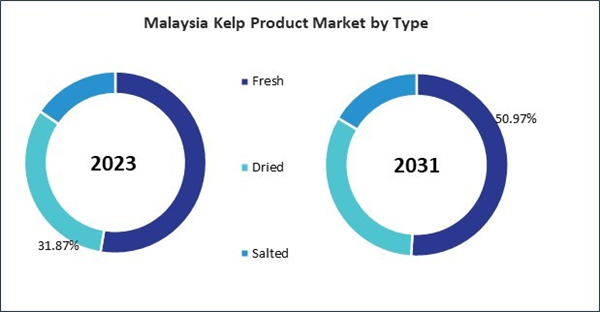Liquid kelp extracts, derived from seaweed, contain a concentrated blend of nutrients, bioactive compounds, and growth-promoting hormones that promote plant growth, improve soil health, and enhance crop productivity in agriculture. These liquid formulations are applied through fertigation systems, foliar sprays, or soil drenches, allowing for precise and efficient nutrient delivery to plants. Therefore, the China market used 655.24 Tonnes of liquid form kelp product in the market in 2023.
The China market dominated the Asia Pacific Kelp Product Market by Country in 2023 and would continue to be a dominant market till 2031; thereby, achieving a market value of $121.8 million by 2031. The Japan market is registering a CAGR of 5.3% during (2024 - 2031). Additionally, The India market would showcase a CAGR of 6.6% during (2024 - 2031).
As consumers increasingly prioritize natural and nutritious ingredients, kelp's nutritional richness, which includes essential vitamins, minerals, and antioxidants, has positioned it as a sought-after ingredient in dietary supplements, functional foods, and beverages. Moreover, the growing demand for plant-based alternatives and sustainable sourcing has fueled the incorporation of kelp into culinary products such as noodles, snacks, and condiments, offering flavor enhancement and nutritional benefits.
Moreover, beyond nutrition, kelp's versatile properties extend into cosmetics and skincare, where its antioxidant and moisturizing qualities are harnessed in various skincare formulations. With the rise of eco-conscious consumerism, the demand for natural and sustainably sourced ingredients is expanding, driving the adoption of kelp-derived extracts in cosmetics as environmentally friendly alternatives to synthetic additives. Furthermore, kelp's potential as a renewable resource is gaining traction in agriculture and bioplastics, where kelp extracts are utilized as organic fertilizers and biodegradable materials, contributing to developing more sustainable practices.
Livestock farming is a significant source of income and livelihood for millions across Asia-Pacific. It contributes to many areas' food security, rural employment, and poverty reduction. Livestock products such as meat, milk, eggs, and hides are important domestic and export commodities. Seaweed-based additives have been shown to improve the health and productivity of livestock, making them a potential solution for the agricultural industry in India and other countries in the region. Hence, the food and grocery sector, along with livestock farming, drive the growth of the kelp product market in the Asia Pacific region.
Based on Form, the market is segmented into Powder, Liquid, and Flakes. Based on Application, the market is segmented into Agriculture, Food, Pharmaceuticals and Others. Based on Type, the market is segmented into Fresh, Dried and Salted. Based on countries, the market is segmented into China, Japan, India, South Korea, Australia, Malaysia, and Rest of Asia Pacific.
List of Key Companies Profiled
- Seasol International Pty Ltd.
- Cargill, Incorporated
- CP Kelco
- Groupe Roullier
- Acadian Seaplants Limited
- Gelymar SA (Algina Inversiones SA)
- DuPont de Nemours, Inc.
- Brandt, Inc.
- COMPO Group
- Wild Irish Seaweeds Ltd.
Market Report Segmentation
By Form (Volume, Tonnes, USD Billion, 2020-31)- Powder
- Liquid
- Flakes
- Agriculture
- Food
- Pharmaceuticals
- Others
- Fresh
- Dried
- Salted
- China
- Japan
- India
- South Korea
- Australia
- Malaysia
- Rest of Asia Pacific
Table of Contents
Companies Mentioned
- Seasol International Pty Ltd.
- Cargill, Incorporated
- CP Kelco
- Groupe Roullier
- Acadian Seaplants Limited
- Gelymar SA (Algina Inversiones SA)
- DuPont de Nemours, Inc.
- Brandt, Inc.
- COMPO Group
- Wild Irish Seaweeds Ltd.









